初中新概念英语第一册 下半册Lesson 87-88 课件(共59张PPT)
文档属性
| 名称 | 初中新概念英语第一册 下半册Lesson 87-88 课件(共59张PPT) |  | |
| 格式 | pptx | ||
| 文件大小 | 1.1MB | ||
| 资源类型 | 教案 | ||
| 版本资源 | 新概念英语 | ||
| 科目 | 英语 | ||
| 更新时间 | 2024-01-06 08:46:52 | ||
图片预览

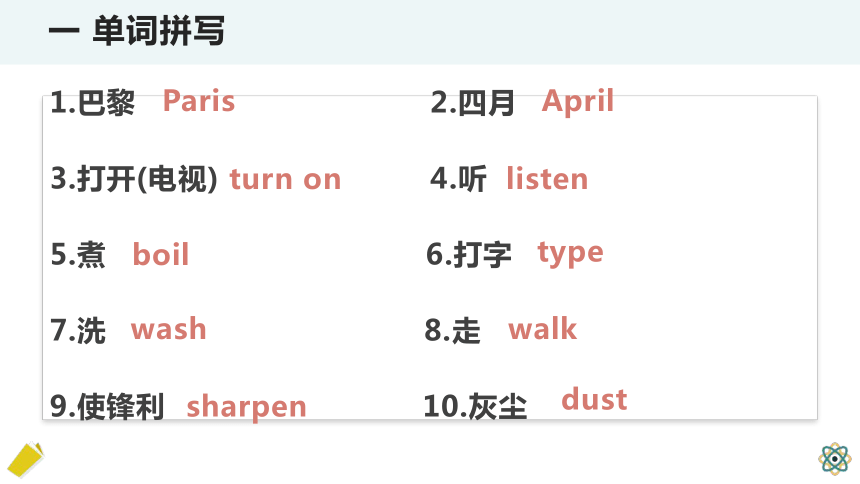
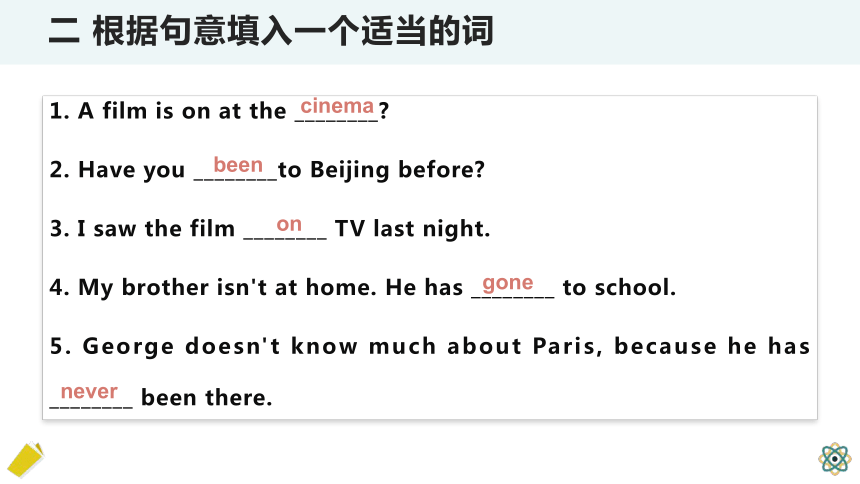
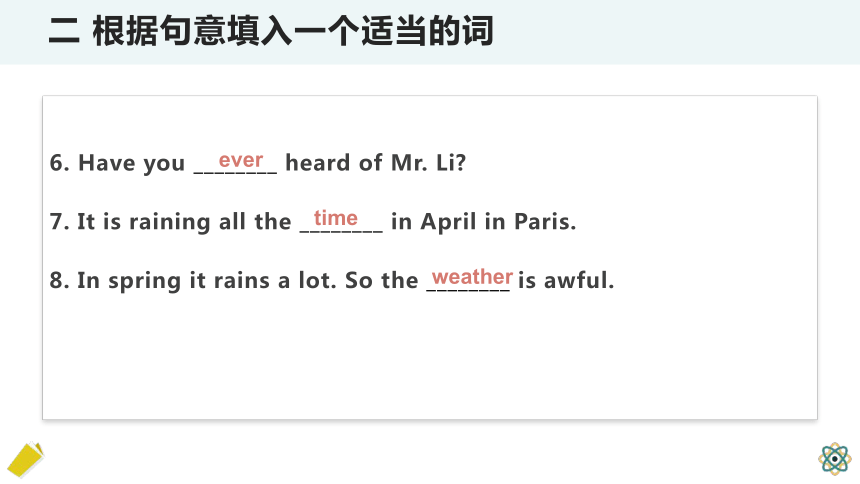
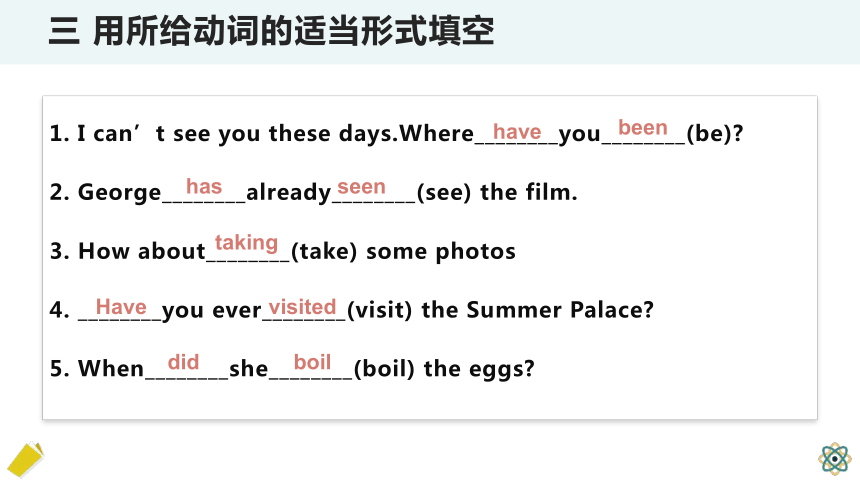
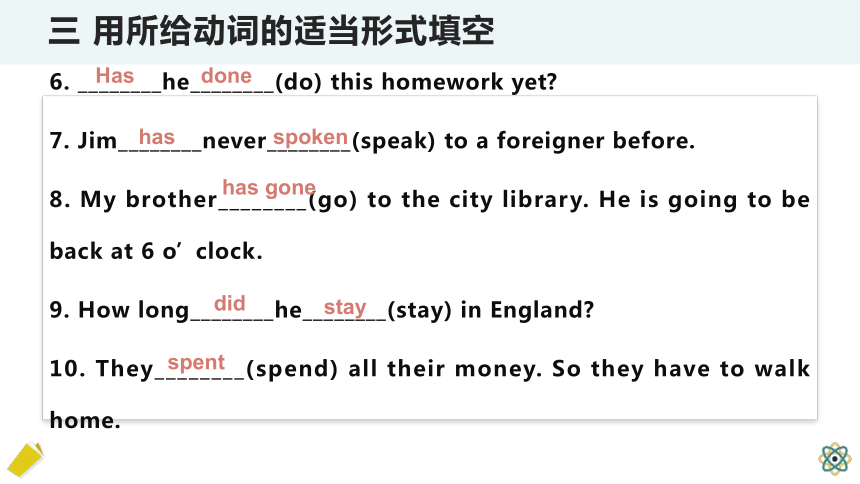
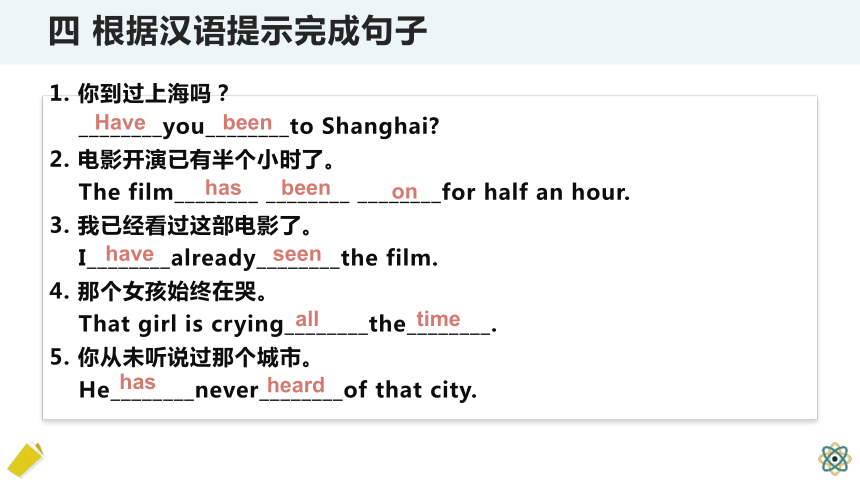

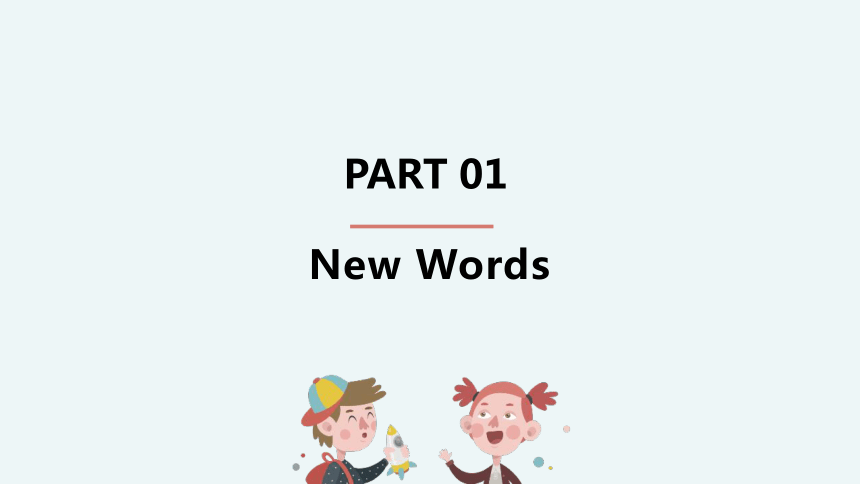
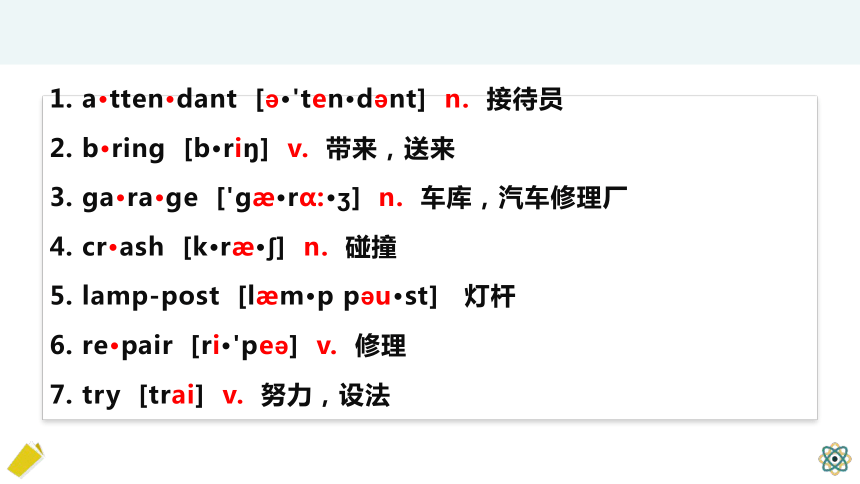
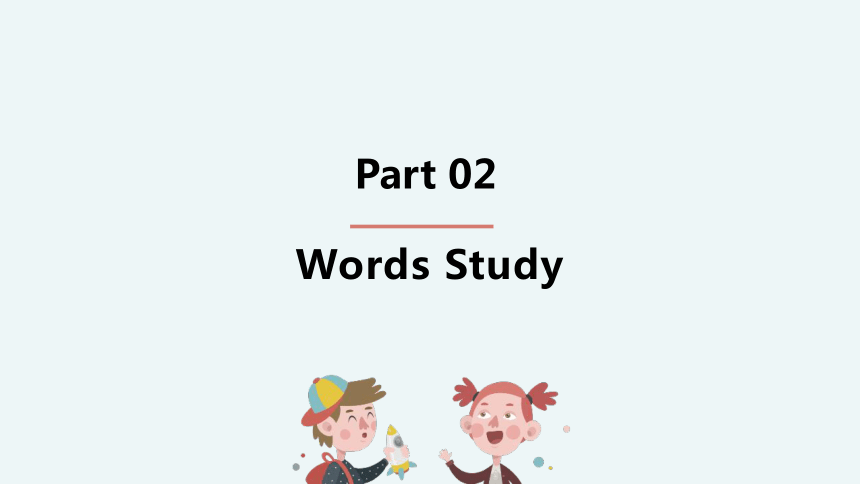
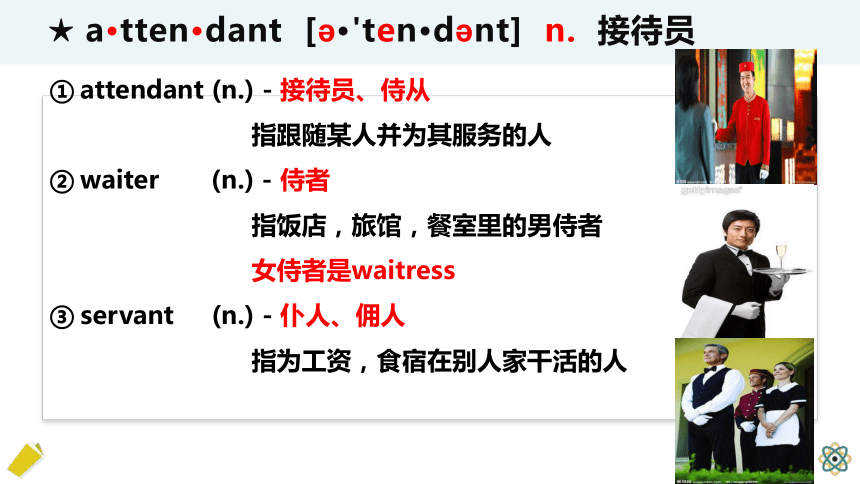
文档简介
(共59张PPT)
Review 85-86
1.巴黎 2.四月
3.打开(电视) 4.听
5.煮 6.打字
7.洗 8.走
9.使锋利 10.灰尘
一 单词拼写
Paris
April
turn on
listen
boil
type
wash
walk
sharpen
dust
1. A film is on at the ________
2. Have you ________to Beijing before
3. I saw the film ________ TV last night.
4. My brother isn't at home. He has ________ to school.
5. George doesn't know much about Paris, because he has ________ been there.
二 根据句意填入一个适当的词
cinema
been
on
gone
never
6. Have you ________ heard of Mr. Li
7. It is raining all the ________ in April in Paris.
8. In spring it rains a lot. So the ________ is awful.
二 根据句意填入一个适当的词
ever
time
weather
1. I can’t see you these days.Where________you________(be)
2. George________already________(see) the film.
3. How about________(take) some photos
4. ________you ever________(visit) the Summer Palace
5. When________she________(boil) the eggs
三 用所给动词的适当形式填空
have
been
has
seen
taking
Have
visited
did
boil
6. ________he________(do) this homework yet
7. Jim________never________(speak) to a foreigner before.
8. My brother________(go) to the city library. He is going to be back at 6 o’clock.
9. How long________he________(stay) in England
10. They________(spend) all their money. So they have to walk home.
三 用所给动词的适当形式填空
Has
done
has
spoken
has gone
did
stay
spent
1. 你到过上海吗?
________you________to Shanghai
2. 电影开演已有半个小时了。
The film________ ________ ________for half an hour.
3. 我已经看过这部电影了。
I________already________the film.
4. 那个女孩始终在哭。
That girl is crying________the________.
5. 你从未听说过那个城市。
He________never________of that city.
四 根据汉语提示完成句子
Have
been
has
been
on
have
seen
all
time
has
heard
87-88
A Car Crash
New Words
PART 01
1. a·tten·dant [ ·'ten·d nt] n. 接待员
2. b·ring [b·ri ] v. 带来,送来
3. ga·ra·ge ['g ·rɑ:· ] n. 车库,汽车修理厂
4. cr·ash [k·r · ] n. 碰撞
5. lamp-post [l m·p p u·st] 灯杆
6. re·pair [ri·'pe ] v. 修理
7. try [trai] v. 努力,设法
Words Study
Part 02
① attendant (n.) - 接待员、侍从
指跟随某人并为其服务的人
② waiter (n.) - 侍者
指饭店,旅馆,餐室里的男侍者
女侍者是waitress
③ servant (n.) - 仆人、佣人
指为工资,食宿在别人家干活的人
★ a·tten·dant [ ·'ten·d nt] n. 接待员
★ attend [ 'tend] v. 参加
attend school=go to school
上学
attend a meeting
出席会议
attend a wedding
参加婚礼
★ a·tten·dant [ ·'ten·d nt] n. 接待员
① bring-brought-brought
今天是什么风把你吹来了
What brings you here today
我将随身带那本书。
I will bring that book with me.
★ b·ring [b·ri ] v. 带来,送来
【词组】
bring sb. sth. = bring sth. to sb.
bring sth. with sb.
bring sb. with sb.
bring sth./sb. home
bring back
bring sb/sth to 地点
★ b·ring [b·ri ] v. 带来,送来
给某人带/拿来某物
随身带来某物
把某人随同……一起带来
把某物/某人带回家
带回 归还
将某人或某物带到某地来
1. 她给我带来了一个好消息。
She brings a piece of good news to me.
=She brings me a piece of good news.
2. 我可以陪你医院吗
May I bring you to hosiptal
3. 老师让我把书带来学校。
The teacher asked me to bring my books to school.
★ b·ring [b·ri ] v. 带来,送来
① bring是带来,带给说话的人;
② take是带去,从说话的人身边带走;
take - took - taken
take sth/sb.to 地点“把某物或某人带到说话者处去”
把我带回家
Take me home.
他带了很多吃的去公园。
He take a lot of food to park.
bring和take的用法
★ ga·ra·ge ['g ·rɑ:· ] n. 车库,汽车修理厂
① have a crash 撞车
他们每周都撞车.
They have a crash every week.
② v. 撞坏;撞毁
③ a plane crash
a car crash
a loud crash
air crash
crash down
★ cr·ash [k·r · ] n. 碰撞
一次坠机事件
一场车祸
一声巨响
空难
崩塌;倒下
★ lamp-post [l m·p p u·st] 灯杆
lamp n.灯 vt.照亮
① v. 修理;修复;修补
I'll have to get the bicycle repaired.
我要把自行车修一下。
② v. 弥补;修复;赔偿
How can I repair the mistake I have made
我怎么才能弥补我犯的错误呢?
③ mend, fix
★ re·pair [ri·'pe ] v. 修理
① v. 试图;设法,努力
他正试图搬动那个书架。
He is trying to move the bookshelf.
They tried hard to repair the damaged car.
他们竭尽全力修理那辆被损坏了的汽车。
★ try [trai] v. 努力,设法
② v. 尝试,试用;试验
I'll try that Italian restaurant next time.
下次我要到那家意大利餐馆去尝尝他们的菜。
★ try [trai] v. 努力,设法
★ try [trai] v. 努力,设法
try to do sth
try doing sth
You must try to be more careful.
你可要多加小心。
I tried gardening but didn't succeed.
我试着种果木花卉,但未成功。
努力做某事(下决心要把它做好了)
尝试做什么事(这个只是试试看)
★ try [trai] v. 努力,设法
try one's best=do one's best to do sth
I want to try my best.
我想要尽我最大努力。
I have already tried my best.
我已经尽过最大努力了。
尽某人最大的努力
★ try [trai] v. 努力,设法
n. 尝试,试验
have a try
It's a good try.
很好的尝试。
This plan is worth a try.
这项计划值得一试。
尝试
Listen & Read
Part 03
MR. WOOD: Is my car ready yet
ATTENDANT: I don't know, sir.
What's the number of your car
MR. WOOD: It is LFZ 312G.
ATTENDANT: When did you bring it to us
MR. WOOD: I brought it here three days ago.
★ Is my car ready yet 我的车修好了吗?
① yet一般是完成时的标志词。(用于否定句或疑问句中)
Is dinner ready yet, Carol 卡罗,晚饭已经准备好了吗?
② yet有时也可用于现在时, 表示“已经”。
Haven't you been Hong Kong yet 你还没去过香港吗
Is it raining yet 已经在下雨了吗
★ What's the number of your car
① number n. 数字,号码
② a number of + 可数名词复数 “许多的,大量的当”
A number of students are playing football on the playground.
许多学生在操场上踢足球。
② the number of + 名词“……的数量”
The number of the apples is 40.
苹果的数量是40。
ATTENDANT: Ah, yes, I remember now.
MR. WOOD: Have your mechanics finished yet
ATTENDANT: No, they're still working on it.
Let's go into the garage and
have a look at it.
★remember v. 记住,及其,记得
① remember sb. 记得某人
② remember to do sth. 记得要去做某事(还没做)
③remember doing sth. 记得做过某事(已做完)
Please remember to lock the door when you go out.
出门前记得锁门。
Don’t worry. I remember posting all the letters.
别担心。我记得把信都寄出去了。
★ Have your mechanics finished yet
① finish sth. 完成…
完成我的作业
finish my homework
② finish doing 做完…
做完我的作业
finish doing my homework
★ They're still working on it
① work on 继续工作
② be still working on sth. 仍在努力中
—Did you finish your papers? 你写完论文了吗?
—I’m still working on the papers. 我还在写呢。
★ Let's go into the garage and have a look at it.
① let sb.do 让某人做某事
② have a look at sth. 看一看 = take a look at sth.
③ have短语
have a seat 坐下,就座 have a talk with sb. 和……聊一聊
have a try 试一试 have a break/rest 休息一下
have a bath/shower 洗个澡
ATTENDANT: Isn't that your car
MR. WOOD: Well, it was my car.
ATTENDANT: Didn't you have a crash
MR. WOOD: That's right.
I drove it into a lamp-post.
Can your mechanics repair it
ATTENDANT: Well, they're trying to repair it, sir.
But to tell you the truth,
you need a new car!
★ But to tell you the truth, you need a new car!
① to tell you the truth 实话说;跟您说实话
② truth n. 事实,真相 true adj. 真实的,真正的 truly adv. 真正地,忠诚地
③ tell a lie 撒谎 tell a story to sb. 给……讲故事 have a seat 坐下,就座 have a talk with sb. 和……聊一聊
④ 此处的need是实义动词。
need + n./to do sth./doing sth.
Grammar
Part 04
★ 现在完成时的用法:
①现在完成时表示过去某时发生的行为对主语目前产生的影响。即用过去发生的某个行为来说明现在的某种情况。
肯定句式:
主语+have (has)+过去分词
否定句式:
主语+have (has)+not +过去分词
一般疑问句:
Have (Has)+主语+过去分词?
特殊疑问句:
特疑词+ have (has)+主语+过去分词?
② 表示动作发生在过去某个不确定的时间,但对现在留下了某种影响和结果。
常被just、already、yet 等副词修饰。
-Have you had lunch yet
你(已经)吃午饭了吗?
-Yes, I have. I've just had it.
我刚刚吃过。(现在我不饿了)
③ 表示从过去某一时刻开始一直持续到现在的动作或状态。这个动作可能刚停止,可能仍然在进行。
常带有for和since等表示一段时间的状语。
He has taught here since 1981.
他自1981年就在这儿教书。
I haven't seen her for four years.
我有四年没见到她了。
④ 表示说话前发生过一次或多次的动作,现在成为一种经验,一般译为汉语“过”,常带有twice , ever, never,three times 等时间状语。
I have been to Beijing twice.
我去过北京两次。
不规则动词的过去式以及过去分词
巧记规律
AAA: put– put –put let—let –let
ABA: become—became—become
ABB: stand—stood—stood
ABC: eat— ate—eaten
现在完成时的时间状语:
现在完成时属于现在时范围,故不能和过去的时间状语连用。:
yesterday,
last Sunday,
in 1990,
three years ago
现在完成时可以和带有since或for等表示“一段时间”的状语连
用,表示动作或状态从某一时刻开始,一直持续到现在。
I haven‘t seen him for two years.
但是,像come,arrive,buy等终止性动词不能与表示“一段时间”
的状语连用。要用,必须改为“be(在)”等延续性动词来表述。
I have bought this car for twenty years.
arrive→be here begin(start)→be on
die→be dead come back→be back
leave→be away fall ill(sick,asleep)→be
get up→be up
join →be in或 be a member of…
open→be open go out →be out
finish →be over put on→wear 或be on
close→be closed go to school→be a student
borrow→keep buy→have
catch(a cold)→ have(a cold) get to know →know
begin to study→study come to work→work等
非延续性动词到延续性动词的转换
现在完成时可表示持续到现在的动作或状态,动词一般是延续性的,如
live, teach, learn, work, study, know.
过去时常用的非持续性动词有:
come, go, leave, start, die, finish, become, get married.
have /has been to
曾经去过某地回来了
have /has gone to
去过某地还没回来
have /has been in
一直待在某地
现在完成时态特殊形式
一般过去时与现在完成时区别
1. 现在完成时的构成:
have (has)+动词的过去分词
助动词和主语的人称、数要保持一致,属于现在时范围。
2. 一般过去时的构成:
主语 + was/were + 过去式
I saw this film yesterday.
(强调看的动作发生过了。)
I have seen this film.
(强调对现在的影响,电影的内容已经知道了。)
Why did you get up so early
(强调起床的动作已发生过了)
Who hasn't handed in his paper
(强调有卷子,可能为不公平竞争。)
She returned yesterday.
(她是昨天回来了。)
She has returned from Paris.
(她已从巴黎回来了。)
already和yet的用法
yet和already都是副词,都表示“已经”一类的意思;
yet用于否定句和疑问句,用在句末;
already用于肯定句,位于句中 ;
A.用already或yet1) Have they taken down the old pictures ___ 2) Most of us have______ finished our compositions.3) He said he hadn’t visited the exhibition ___. yetalreadyyetsince 和 for 用法
since+时间点
since +句子
since +一段时间+ ago
since 用来说明动作起始时间
for+时间段
for用来说明动作延续时间长度。
for+时间段
She has taught in the school for ten years.
她在这所学校教书已经10年了
since+时间点
I haven't eaten anything since breakfast.
我从早饭起就一直没有吃东西。
B.用since或for1) We have learned five lessons ____the beginning of this term.2) Mrs Liao has been in hospital _____last week.3) I have stayed at my aunt’s _____two weeks. sincesincefor现在完成时态特殊形式
have /has been to
曾经去过某地回来了
have /has gone to
去过某地还没回来
have /has been in
一直待在某地
C.用have gone或have been1) Where are the boy students They _____ to the school factory.2) Is your father in No, he ____ to Shenzhen. ____he ever _____ there before Yes, he _____ there several times.3) He asked me if I_____ to Hangzhou before.I told him that I wanted to go there for a visit as I ____ never ____ to that city before.has goneHasbeenhas beenhave beenhavebeenhave gone他总是给我带来很多鲜花。
He always gives me a lot of flowers.
你们修理厂有多少修理工?
How many mechanics are there in your garage
他把车撞到墙上了。
He drives the car into the wall
你就不能借我点钱吗?
Can’t you lend me some money
1.Have you lost your handbag yet (作否定回答)
2.I met the old friend last winter.(划线部分提问)
3. The boss has already left.(划线部分提问)
4.When did you bring us your car (回答上周二)
5.The number of his car is LXE 8976.(划线部分提问)
No ,I haven’t.
When did you meet the old friend
Who has left yet
I brought my car to you last Tuesday.
I brought it here last Tuesday.
What is the number of his car
1.Mother ____me a new coat yesterday. I _______ it on. It fits me well.A. had made…have tried B. made…have tried C. has made…tried D. made…tried2 “He ____to draw horses already”. “When ______ he “ Last year “ A. learned…has B. learned…did C. has learned…has D. has learned…didBD3.Tom _____up into the tree. Look, he ____ high up there ! A. has got…is B. has climbed…was C. got …was D. climbed…is4.____ you _____ the text yet Yes, we ____ it two hours ago. A. Did…copy…did B. Have…copied…have C. Have…copied…did D. Did …copy…hadAC
Review 85-86
1.巴黎 2.四月
3.打开(电视) 4.听
5.煮 6.打字
7.洗 8.走
9.使锋利 10.灰尘
一 单词拼写
Paris
April
turn on
listen
boil
type
wash
walk
sharpen
dust
1. A film is on at the ________
2. Have you ________to Beijing before
3. I saw the film ________ TV last night.
4. My brother isn't at home. He has ________ to school.
5. George doesn't know much about Paris, because he has ________ been there.
二 根据句意填入一个适当的词
cinema
been
on
gone
never
6. Have you ________ heard of Mr. Li
7. It is raining all the ________ in April in Paris.
8. In spring it rains a lot. So the ________ is awful.
二 根据句意填入一个适当的词
ever
time
weather
1. I can’t see you these days.Where________you________(be)
2. George________already________(see) the film.
3. How about________(take) some photos
4. ________you ever________(visit) the Summer Palace
5. When________she________(boil) the eggs
三 用所给动词的适当形式填空
have
been
has
seen
taking
Have
visited
did
boil
6. ________he________(do) this homework yet
7. Jim________never________(speak) to a foreigner before.
8. My brother________(go) to the city library. He is going to be back at 6 o’clock.
9. How long________he________(stay) in England
10. They________(spend) all their money. So they have to walk home.
三 用所给动词的适当形式填空
Has
done
has
spoken
has gone
did
stay
spent
1. 你到过上海吗?
________you________to Shanghai
2. 电影开演已有半个小时了。
The film________ ________ ________for half an hour.
3. 我已经看过这部电影了。
I________already________the film.
4. 那个女孩始终在哭。
That girl is crying________the________.
5. 你从未听说过那个城市。
He________never________of that city.
四 根据汉语提示完成句子
Have
been
has
been
on
have
seen
all
time
has
heard
87-88
A Car Crash
New Words
PART 01
1. a·tten·dant [ ·'ten·d nt] n. 接待员
2. b·ring [b·ri ] v. 带来,送来
3. ga·ra·ge ['g ·rɑ:· ] n. 车库,汽车修理厂
4. cr·ash [k·r · ] n. 碰撞
5. lamp-post [l m·p p u·st] 灯杆
6. re·pair [ri·'pe ] v. 修理
7. try [trai] v. 努力,设法
Words Study
Part 02
① attendant (n.) - 接待员、侍从
指跟随某人并为其服务的人
② waiter (n.) - 侍者
指饭店,旅馆,餐室里的男侍者
女侍者是waitress
③ servant (n.) - 仆人、佣人
指为工资,食宿在别人家干活的人
★ a·tten·dant [ ·'ten·d nt] n. 接待员
★ attend [ 'tend] v. 参加
attend school=go to school
上学
attend a meeting
出席会议
attend a wedding
参加婚礼
★ a·tten·dant [ ·'ten·d nt] n. 接待员
① bring-brought-brought
今天是什么风把你吹来了
What brings you here today
我将随身带那本书。
I will bring that book with me.
★ b·ring [b·ri ] v. 带来,送来
【词组】
bring sb. sth. = bring sth. to sb.
bring sth. with sb.
bring sb. with sb.
bring sth./sb. home
bring back
bring sb/sth to 地点
★ b·ring [b·ri ] v. 带来,送来
给某人带/拿来某物
随身带来某物
把某人随同……一起带来
把某物/某人带回家
带回 归还
将某人或某物带到某地来
1. 她给我带来了一个好消息。
She brings a piece of good news to me.
=She brings me a piece of good news.
2. 我可以陪你医院吗
May I bring you to hosiptal
3. 老师让我把书带来学校。
The teacher asked me to bring my books to school.
★ b·ring [b·ri ] v. 带来,送来
① bring是带来,带给说话的人;
② take是带去,从说话的人身边带走;
take - took - taken
take sth/sb.to 地点“把某物或某人带到说话者处去”
把我带回家
Take me home.
他带了很多吃的去公园。
He take a lot of food to park.
bring和take的用法
★ ga·ra·ge ['g ·rɑ:· ] n. 车库,汽车修理厂
① have a crash 撞车
他们每周都撞车.
They have a crash every week.
② v. 撞坏;撞毁
③ a plane crash
a car crash
a loud crash
air crash
crash down
★ cr·ash [k·r · ] n. 碰撞
一次坠机事件
一场车祸
一声巨响
空难
崩塌;倒下
★ lamp-post [l m·p p u·st] 灯杆
lamp n.灯 vt.照亮
① v. 修理;修复;修补
I'll have to get the bicycle repaired.
我要把自行车修一下。
② v. 弥补;修复;赔偿
How can I repair the mistake I have made
我怎么才能弥补我犯的错误呢?
③ mend, fix
★ re·pair [ri·'pe ] v. 修理
① v. 试图;设法,努力
他正试图搬动那个书架。
He is trying to move the bookshelf.
They tried hard to repair the damaged car.
他们竭尽全力修理那辆被损坏了的汽车。
★ try [trai] v. 努力,设法
② v. 尝试,试用;试验
I'll try that Italian restaurant next time.
下次我要到那家意大利餐馆去尝尝他们的菜。
★ try [trai] v. 努力,设法
★ try [trai] v. 努力,设法
try to do sth
try doing sth
You must try to be more careful.
你可要多加小心。
I tried gardening but didn't succeed.
我试着种果木花卉,但未成功。
努力做某事(下决心要把它做好了)
尝试做什么事(这个只是试试看)
★ try [trai] v. 努力,设法
try one's best=do one's best to do sth
I want to try my best.
我想要尽我最大努力。
I have already tried my best.
我已经尽过最大努力了。
尽某人最大的努力
★ try [trai] v. 努力,设法
n. 尝试,试验
have a try
It's a good try.
很好的尝试。
This plan is worth a try.
这项计划值得一试。
尝试
Listen & Read
Part 03
MR. WOOD: Is my car ready yet
ATTENDANT: I don't know, sir.
What's the number of your car
MR. WOOD: It is LFZ 312G.
ATTENDANT: When did you bring it to us
MR. WOOD: I brought it here three days ago.
★ Is my car ready yet 我的车修好了吗?
① yet一般是完成时的标志词。(用于否定句或疑问句中)
Is dinner ready yet, Carol 卡罗,晚饭已经准备好了吗?
② yet有时也可用于现在时, 表示“已经”。
Haven't you been Hong Kong yet 你还没去过香港吗
Is it raining yet 已经在下雨了吗
★ What's the number of your car
① number n. 数字,号码
② a number of + 可数名词复数 “许多的,大量的当”
A number of students are playing football on the playground.
许多学生在操场上踢足球。
② the number of + 名词“……的数量”
The number of the apples is 40.
苹果的数量是40。
ATTENDANT: Ah, yes, I remember now.
MR. WOOD: Have your mechanics finished yet
ATTENDANT: No, they're still working on it.
Let's go into the garage and
have a look at it.
★remember v. 记住,及其,记得
① remember sb. 记得某人
② remember to do sth. 记得要去做某事(还没做)
③remember doing sth. 记得做过某事(已做完)
Please remember to lock the door when you go out.
出门前记得锁门。
Don’t worry. I remember posting all the letters.
别担心。我记得把信都寄出去了。
★ Have your mechanics finished yet
① finish sth. 完成…
完成我的作业
finish my homework
② finish doing 做完…
做完我的作业
finish doing my homework
★ They're still working on it
① work on 继续工作
② be still working on sth. 仍在努力中
—Did you finish your papers? 你写完论文了吗?
—I’m still working on the papers. 我还在写呢。
★ Let's go into the garage and have a look at it.
① let sb.do 让某人做某事
② have a look at sth. 看一看 = take a look at sth.
③ have短语
have a seat 坐下,就座 have a talk with sb. 和……聊一聊
have a try 试一试 have a break/rest 休息一下
have a bath/shower 洗个澡
ATTENDANT: Isn't that your car
MR. WOOD: Well, it was my car.
ATTENDANT: Didn't you have a crash
MR. WOOD: That's right.
I drove it into a lamp-post.
Can your mechanics repair it
ATTENDANT: Well, they're trying to repair it, sir.
But to tell you the truth,
you need a new car!
★ But to tell you the truth, you need a new car!
① to tell you the truth 实话说;跟您说实话
② truth n. 事实,真相 true adj. 真实的,真正的 truly adv. 真正地,忠诚地
③ tell a lie 撒谎 tell a story to sb. 给……讲故事 have a seat 坐下,就座 have a talk with sb. 和……聊一聊
④ 此处的need是实义动词。
need + n./to do sth./doing sth.
Grammar
Part 04
★ 现在完成时的用法:
①现在完成时表示过去某时发生的行为对主语目前产生的影响。即用过去发生的某个行为来说明现在的某种情况。
肯定句式:
主语+have (has)+过去分词
否定句式:
主语+have (has)+not +过去分词
一般疑问句:
Have (Has)+主语+过去分词?
特殊疑问句:
特疑词+ have (has)+主语+过去分词?
② 表示动作发生在过去某个不确定的时间,但对现在留下了某种影响和结果。
常被just、already、yet 等副词修饰。
-Have you had lunch yet
你(已经)吃午饭了吗?
-Yes, I have. I've just had it.
我刚刚吃过。(现在我不饿了)
③ 表示从过去某一时刻开始一直持续到现在的动作或状态。这个动作可能刚停止,可能仍然在进行。
常带有for和since等表示一段时间的状语。
He has taught here since 1981.
他自1981年就在这儿教书。
I haven't seen her for four years.
我有四年没见到她了。
④ 表示说话前发生过一次或多次的动作,现在成为一种经验,一般译为汉语“过”,常带有twice , ever, never,three times 等时间状语。
I have been to Beijing twice.
我去过北京两次。
不规则动词的过去式以及过去分词
巧记规律
AAA: put– put –put let—let –let
ABA: become—became—become
ABB: stand—stood—stood
ABC: eat— ate—eaten
现在完成时的时间状语:
现在完成时属于现在时范围,故不能和过去的时间状语连用。:
yesterday,
last Sunday,
in 1990,
three years ago
现在完成时可以和带有since或for等表示“一段时间”的状语连
用,表示动作或状态从某一时刻开始,一直持续到现在。
I haven‘t seen him for two years.
但是,像come,arrive,buy等终止性动词不能与表示“一段时间”
的状语连用。要用,必须改为“be(在)”等延续性动词来表述。
I have bought this car for twenty years.
arrive→be here begin(start)→be on
die→be dead come back→be back
leave→be away fall ill(sick,asleep)→be
get up→be up
join →be in或 be a member of…
open→be open go out →be out
finish →be over put on→wear 或be on
close→be closed go to school→be a student
borrow→keep buy→have
catch(a cold)→ have(a cold) get to know →know
begin to study→study come to work→work等
非延续性动词到延续性动词的转换
现在完成时可表示持续到现在的动作或状态,动词一般是延续性的,如
live, teach, learn, work, study, know.
过去时常用的非持续性动词有:
come, go, leave, start, die, finish, become, get married.
have /has been to
曾经去过某地回来了
have /has gone to
去过某地还没回来
have /has been in
一直待在某地
现在完成时态特殊形式
一般过去时与现在完成时区别
1. 现在完成时的构成:
have (has)+动词的过去分词
助动词和主语的人称、数要保持一致,属于现在时范围。
2. 一般过去时的构成:
主语 + was/were + 过去式
I saw this film yesterday.
(强调看的动作发生过了。)
I have seen this film.
(强调对现在的影响,电影的内容已经知道了。)
Why did you get up so early
(强调起床的动作已发生过了)
Who hasn't handed in his paper
(强调有卷子,可能为不公平竞争。)
She returned yesterday.
(她是昨天回来了。)
She has returned from Paris.
(她已从巴黎回来了。)
already和yet的用法
yet和already都是副词,都表示“已经”一类的意思;
yet用于否定句和疑问句,用在句末;
already用于肯定句,位于句中 ;
A.用already或yet1) Have they taken down the old pictures ___ 2) Most of us have______ finished our compositions.3) He said he hadn’t visited the exhibition ___. yetalreadyyetsince 和 for 用法
since+时间点
since +句子
since +一段时间+ ago
since 用来说明动作起始时间
for+时间段
for用来说明动作延续时间长度。
for+时间段
She has taught in the school for ten years.
她在这所学校教书已经10年了
since+时间点
I haven't eaten anything since breakfast.
我从早饭起就一直没有吃东西。
B.用since或for1) We have learned five lessons ____the beginning of this term.2) Mrs Liao has been in hospital _____last week.3) I have stayed at my aunt’s _____two weeks. sincesincefor现在完成时态特殊形式
have /has been to
曾经去过某地回来了
have /has gone to
去过某地还没回来
have /has been in
一直待在某地
C.用have gone或have been1) Where are the boy students They _____ to the school factory.2) Is your father in No, he ____ to Shenzhen. ____he ever _____ there before Yes, he _____ there several times.3) He asked me if I_____ to Hangzhou before.I told him that I wanted to go there for a visit as I ____ never ____ to that city before.has goneHasbeenhas beenhave beenhavebeenhave gone他总是给我带来很多鲜花。
He always gives me a lot of flowers.
你们修理厂有多少修理工?
How many mechanics are there in your garage
他把车撞到墙上了。
He drives the car into the wall
你就不能借我点钱吗?
Can’t you lend me some money
1.Have you lost your handbag yet (作否定回答)
2.I met the old friend last winter.(划线部分提问)
3. The boss has already left.(划线部分提问)
4.When did you bring us your car (回答上周二)
5.The number of his car is LXE 8976.(划线部分提问)
No ,I haven’t.
When did you meet the old friend
Who has left yet
I brought my car to you last Tuesday.
I brought it here last Tuesday.
What is the number of his car
1.Mother ____me a new coat yesterday. I _______ it on. It fits me well.A. had made…have tried B. made…have tried C. has made…tried D. made…tried2 “He ____to draw horses already”. “When ______ he “ Last year “ A. learned…has B. learned…did C. has learned…has D. has learned…didBD3.Tom _____up into the tree. Look, he ____ high up there ! A. has got…is B. has climbed…was C. got …was D. climbed…is4.____ you _____ the text yet Yes, we ____ it two hours ago. A. Did…copy…did B. Have…copied…have C. Have…copied…did D. Did …copy…hadAC
同课章节目录
